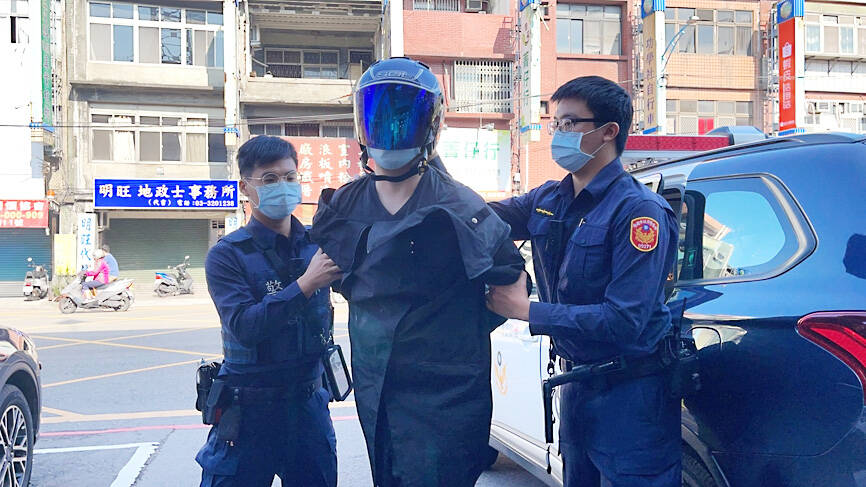The High Court on Thursday overturned a capital conviction and sentenced a man to life in prison for fatally stabbing a convenience store clerk who had asked him to wear a mask.
At about 4am on Nov. 21, 2021, Chiang Chia-kai (蔣嘉凱), a paper sculpture artist, walked into a convenience store in Taoyuan’s Gueishan District (龜山) and was told by the clerk, surnamed Tsai (蔡), that he had to put on a mask, court records show.
Chiang reluctantly left the store, but soon returned wearing a mask. He became involved in an altercation with the 30-year-old Tsai, threw his mask at the clerk and left. He returned a second time dressed in different clothing, called Tsai, who was in a backroom, to come out and stabbed him with a knife.

Photo: Chen En-hui, Taipei Times
Although Tsai was able to disarm Chiang during the ensuing scuffle, he collapsed outside the store due to excessive bleeding.
He later died of hypovolemic shock as a result of being stabbed 13 times, including three times in the heart.
During the first trial at the Taoyuan District Court, Chiang was sentenced to death on the grounds that the murder was premeditated — as he had changed his clothes to disguise his identity — and that he did not have a mental illness.
Because the court issued a death sentence, the case was automatically sent for appeal to the High Court, in accordance with Article 344 of the Code of Criminal Procedure (刑事訴訟法).
In its verdict on Thursday, the High Court said that Chiang was in the habit of taking and randomly mixing sedatives, sleep aids and prescribed anti-anxiety medications, including on the day of the murder.
An analysis by Taipei City Hospital’s Songde branch said that the drugs Chiang had taken likely played some role in his violent, antisocial behavior, as well as his lack of self-control, the court said.
In reducing the sentence to life in prison, the court said it had attempted to balance its conclusion that Chiang’s actions were partially related to his drug abuse and that he could be rehabilitated with the “malevolent” nature of his crime and the harm he had done.
The ruling can be appealed.

Trips for more than 100,000 international and domestic air travelers could be disrupted as China launches a military exercise around Taiwan today, Taiwan’s Civil Aviation Administration (CAA) said yesterday. The exercise could affect nearly 900 flights scheduled to enter the Taipei Flight Information Region (FIR) during the exercise window, it added. A notice issued by the Chinese Civil Aviation Administration showed there would be seven temporary zones around the Taiwan Strait which would be used for live-fire exercises, lasting from 8am to 6pm today. All aircraft are prohibited from entering during exercise, it says. Taipei FIR has 14 international air routes and

Taiwan lacks effective and cost-efficient armaments to intercept rockets, making the planned “T-Dome” interception system necessary, two experts said on Tuesday. The concerns were raised after China’s military fired two waves of rockets during live-fire drills around Taiwan on Tuesday, part of two-day exercises code-named “Justice Mission 2025.” The first wave involved 17 rockets launched at 9am from Pingtan in China’s Fujian Province, according to Lieutenant General Hsieh Jih-sheng (謝日升) of the Office of the Deputy Chief of the General Staff for Intelligence at the Ministry of National Defense. Those rockets landed 70 nautical miles (129.6km) northeast of Keelung without flying over Taiwan,

City buses in Taipei and New Taipei City, as well as the Taipei MRT, would on Saturday begin accepting QR code payments from five electronic payment providers, the Taipei Department of Transportation said yesterday. The new option would allow passengers to use the “transportation QR code” feature from EasyWallet, iPass Money, iCash Pay, Jkopay or PXPay Plus. Passengers should open their preferred electronic payment app, select the “transportation code” — not the regular payment code — unlock it, and scan the code at ticket readers or gates, General Planning Division Director-General Liu Kuo-chu (劉國著) said. People should move through the

The Ministry of National Defense (MND) today released images of the military tracking China’s People's Liberation Army (PLA) movements during the latest round of Chinese drills around Taiwan. The PLA began "Justice Mission 2025" drills today, carrying out live-fire drills, simulated strikes on land and maritime targets, and exercises to blockade the nation's main ports. The exercises are to continue tomorrow, with the PLA announcing sea and air space restrictions for five zones around Taiwan for 10 hours starting from 8:30am. The ministry today released images showing a Chinese J-16 fighter jet tracked by a F-16V Block 20 jet and the